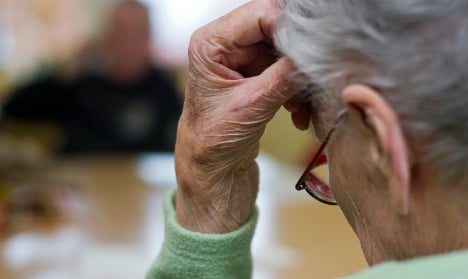While exactly 50 percent of people were concerned about dementia, 68 percent feared a cancer diagnosis above all else, the survey for health insurer DAK-Gesundheit found.
The number saying they feared dementia or Alzheimer's disease increased by one percentage point over the figure for 2014, but short of 2011's peak of 54 percent.
Meanwhile, fear of cancer had fallen one percentage point since 2014 and was well short of its 2010-11 peak of 73 percent.
Young people were even more concerned about cancer than the over-60s, with 73 percent of 14 to 44-year-olds saying they were worried about the disease compared with 60 percent of seniors.
Close behind dementia among worries were serious accidents, stroke and heart attack, at 48 percent, 48 percent and 41 percent respectively.
Heart disorders ought to be top of Germans' priority list, as they were found to be the most common cause of death in a study published in June.
Germans see themselves as healthy
But the survey also found Germans feeling hale and hearty overall, with 86 percent saying they had good or very good overall health.
People in Bavaria and Baden-Württemberg felt the healthiest, with 90 and 89 saying they were in good or very good health respectively, while the number fell to 81 percent in the former East.
And most people said they moderated their behaviour to keep themselves in good health.
Sport was the most popular choice, with 77 percent of respondents saying they regularly exercised to stave off disease.
Close behind were eating healthy at 71 percent, restricting alcohol intake, with 70 percent, and not smoking, at 63 percent.
But those respondents might have been telling porkies, as an OECD paper published in June finding that Germans were the biggest drinkers in western Europe, knocking back 118 litres of beer each year on average.
And 61 percent of people said they read a lot and sought out mental challenges to keep their brains agile in the hope of warding off dementia.
Disease of old age
While around 1.5 million people currently suffer from dementia in Germany, experts expect that number to double by 2050 as the population continues to age, DAK said in a press release.
The study found that the difficulty of predicting who might suffer from dementia was particularly worrying, as was the fact that those affected would likely need to depend on the care of others – reasons named by 70 and 71 percent of the respondents respectively.
DAK welcomed recent reforms of social care introduced by the government, but said more needed to be done to improve co-operation between GPs, specialist doctors and carers in the future as they treat growing numbers of dementia patients.
Polling institute Forsa questioned a representative sample of 3,500 people across the country for the survey.




 Please whitelist us to continue reading.
Please whitelist us to continue reading.
Member comments